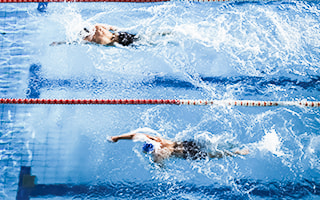Notre Dame Men’s Swimming Suspended Over Gambling Allegations
 Notre Dame, whose men’s swimming program is ranked 16th in the country by NCSA Sports, has made a major move by suspending its team for at least one academic year. The decision comes after both internal and external investigations into gambling within the team.
Notre Dame, whose men’s swimming program is ranked 16th in the country by NCSA Sports, has made a major move by suspending its team for at least one academic year. The decision comes after both internal and external investigations into gambling within the team.
Most of the men’s team implicated in investigations into sports betting
The investigations revealed that a majority of the returning team members have participated in sports betting, which goes directly against NCAA regulations. Notre Dame’s athletic director Pete Bevacqua spoke out against the practice, which seems to have become commonplace in the program despite the rules, calling the practice of gambling “deeply embedded” amongst the swimmers.
Everyone in the team, including incoming freshmen recruits, was informed last week. The timing was chosen in order to give students the possibility of transferring to other universities with swim programs if they have the choice. Notre Dame’s academic year will start on August 27.
The suspension will only affect the men’s swim team. Notre Dame’s women’s team, and both of the college’s diving teams, weren’t found to have anything to do with sports betting, and will therefore proceed with the new year as previously planned.
Investigations also explored whether staff, including head coach Chris Lindauer, had anything to do with the gambling that became widespread within the team. If it was found that Lindauer or others were aware, they would also be considered responsible and face disciplinary action.
However, the investigations found that staff were not aware of the issue, due to the active efforts of team members to hide their activities from coaches. Therefore, coaches will not suffer consequences as a part of the scandal.
A self-created gambling ring for Notre Dame swimmers
The investigations revealed that not only did the men’s swimming team take part in betting, but they actually created their own betting ring to bet on their own times within the team. These were mostly on “over/under” lines. The reason for the self-made sports book is that no legal gambling companies currently allow bets on college-level swim competitions.
The NCAA has had rules in place regarding sports betting for some time. However, the problem has ramped up in recent years, in part due to the widespread availability of legal gambling for more and more citizens, including college students. There are consequences for college athletes who place bets generally, but the worst offenders by NCAA standards are those who place bets on their own competitions. However, this is not one of the biggest sports betting scandals of all time, and is dwarfed by the NCAAB scandal of 1994.
Betting on one’s own team or individual performances can be seen as influencing the outcome of a competition, which is strictly against rules as it undermines a sport’s integrity. The NCAA legislation states that “student-athletes who engage in activities to influence the outcomes of their own games or knowingly provide information to individuals involved in sports betting activities will potentially face permanent loss of collegiate eligibility in all sports.”
Further consequences may await swimmers
Though the students involved in the Notre Dame betting scandal have not yet been permanently banned, the suspension of the team for one year is of course a major wake-up call for those who took part—as well as for those who may consider clandestine betting in the future.
The findings of the investigation may also be known to other school programs, in case these athletes do decide to transfer to new colleges this academic year.
 By Matt Speakman,
By Matt Speakman,

 Gaming Industry Uncertain as Tariffs Impact Financial Markets
Gaming Industry Uncertain as Tariffs Impact Financial Markets NCAA Boosts Responsible Gambling Campaign Due to Betting Ring Scandal
NCAA Boosts Responsible Gambling Campaign Due to Betting Ring Scandal SPGA Warns Louisiana’s SB181 Could Criminalize Loyalty Programs
SPGA Warns Louisiana’s SB181 Could Criminalize Loyalty Programs More Illegal Gambling Websites in Michigan Receive Cease-and-Desist Letters
More Illegal Gambling Websites in Michigan Receive Cease-and-Desist Letters $10.5 Million Fine for Resorts World Las Vegas Casino
$10.5 Million Fine for Resorts World Las Vegas Casino New Jersey DGE Fines Caesars Sportsbook
New Jersey DGE Fines Caesars Sportsbook MGM Prepared to Do Anything to Acquire Entain
MGM Prepared to Do Anything to Acquire Entain Caesars Reveals Plans to Open a Temporary Casino by July Next Year
Caesars Reveals Plans to Open a Temporary Casino by July Next Year Seminole Tribe of Florida Files Replies in the United States Court of Appeals for the District of Columbia
Seminole Tribe of Florida Files Replies in the United States Court of Appeals for the District of Columbia Hollywood Casino Riverboats to Be Moved Inland
Hollywood Casino Riverboats to Be Moved Inland